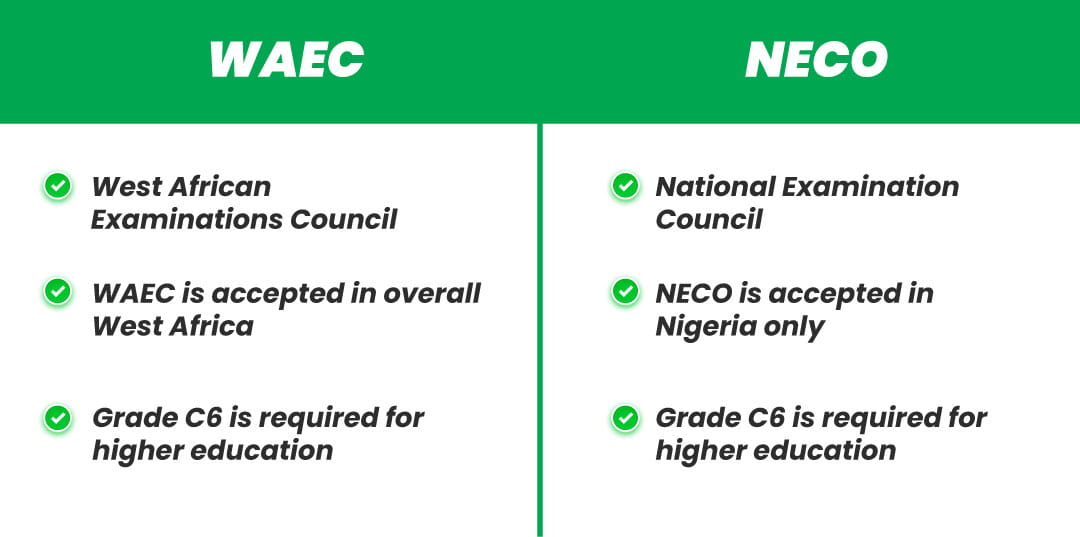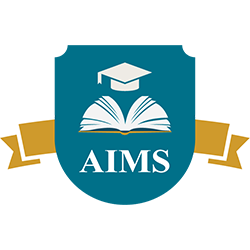The West African Examinations Council (WAEC) and National Examinations Council (NECO) both conduct two examinations in total and assess study results with a letter grade. WAEC and NECO are both examination boards that take senior secondary school examinations (SSCE) for Nigerian students. WAEC also conducts its examinations for West African countries like Ghana and Gambia, whereas NECO conducts its examinations only for Nigerian students.
The WAEC and the NECO have separate exams for students and for people who no longer go to school. For former students, these exams are usually held two times a year in May and June. And the exams for the people who no longer go to school are held in November or December.
In this blog, we will discuss the WAEC and NECO for Nigerian students, including the grading system, document requirements, intakes etc. as these exams are required for studying abroad. So, if you are interested in studying in the UK, USA, Canada or Europe, hopefully, this article will help you to get a better understanding of the entry requirements.
What is WAEC?
WAEC (West African Examinations Council) is the body responsible for conducting senior secondary school exams, known as SSCE, in Nigeria. WAEC also holds exams in other West African countries like Ghana and Gambia. There are two main exams conducted by WAEC.
The first exam of WAEC for Nigerian students is the Senior School Certificate Examination (WASSCE), which is held twice a year, usually in May and June. The second is the General Certificate Examination (GCE), which anyone can take, even if they are not in school. The GCE takes place in November and December.
What is NECO?
NECO (National Examination Council) is a Nigerian exam board that conducts the SSCE exam for students in Nigeria. It is an alternative to WAEC but focuses only on Nigerian students.
Like WAEC, NECO also holds two exams. The first one is the SSCE, which is for students in their final year of secondary school. The first examination of NECO for Nigerian students is held in June and July. The second one is an external SSCE exam, which anyone can take, and it happens in November and December.
Key Differences Between WAEC and NECO Exams?
WAEC and NECO have similar purposes, but they are different in how they are managed and accepted. WAEC is recognized internationally in West Africa, while NECO is mainly focused on Nigeria. Both exams cover similar subjects, but they may have different standards and question formats.

Types of Exams Held by WAEC and NECO
The WAEC and the NECO have separate exams for West African and Nigerian students. The results of a student with a high school diploma from Nigeria will be converted like this: The grades earned on the West African Senior School Certificate (WASSCE) after completing 12th grade and the National Examinations Council (NECO) Senior School Certificate are considered the same as high school final exam results.
The West African Senior School Certificate (WASSCE) from WAEC, with final grades of A1, B2-3, or C4-6 in at least 6 subjects, is considered the same as high school final exams at the advanced level.
The Senior School Certificate from NECO, with final grades of A1 or B2-3 in at least 6 subjects, is also treated as equal to advanced-level high school final exams.
Under the WAEC and NECO marking and grading system, letters A to F show how well a student did, while numbers 1-9 rank the grades. For example, to get an A1 in WASSCE/SSCE Mathematics, you need to score at least 75%. This means you answered 75 out of 100 questions correctly.
WAEC and NECO Exam Format for Nigerian Students
The WACE and NECO take senior secondary school examinations (SSCE) for Nigerian students as well as West African students. SSCE exam format is quite similar for both WAEC and NECO. Each subject usually has two main parts, called papers. Let’s learn the WAEC and NECO exam format for Nigerian students.
- Objective: This section has multiple-choice questions. The candidate chooses one answer from the options, and only one is correct.
- Theory: In this part, candidates are given several questions, but they usually need to answer only a few, depending on the subject. Some questions require detailed explanations or definitions, while others need only short answers.
Subject Areas of SSCE Examination
All students must register for at least eight subjects and can take up to nine. They can choose to take their SSCE exam with one exam body, like WAEC, or take it with more than one (such as both WAEC and NECO) to improve their chances of getting the needed credits. Some universities in Nigeria allow students to combine results from two different SSCE certificates to make up for any missing credits. You have to sit for the SSCE examination
- Three mandatory subjects: English Language, Mathematics, and Civic Education.
- Three to four subjects: Based on the student’s chosen field (sciences, technology, humanities, or business studies).
- At least one trade subject.
General Grading System of WAEC and NECO for Nigerian Students
The grading system of WAEC and NECO for Nigerian students is quite straightforward. WAEC and NECO exams usually use letter grades for results. For example, a grade of 1 is the same as an A1. If a student fails a subject (with a grade like F9 or 9), it is usually not shown on the certificate. Let’s explore the Nigerian grading system of WAEC and NECO examinations.
| Letter Grades | Marks Obtained (%) | Description |
| A1 | 75% – 100% | Excellent |
| B2 | 70%-74% | Very Good |
| B3 | 65%-69% | Good |
| C4 | 60%-64% | Credit |
| C5 | 55%-59% | Credit |
| C6 | 50%-54% | Credit |
| D7 | 45%-49% | Pass |
| E8 | 40%-44% | Pass |
| F9 | 0%-39% | Failure |
Documents Required for WAEC and NECO for Nigerian Students
If you are applying to take the SSCE exams through WAEC or NECO, you will need to submit the following documents:
- Your current high school transcript and certificates (if you have them)
- English proficiency test results, which may be required
- Additional information might be needed for certain programs.
What Can You Do with Your WAEC and NECO Certificates?
WAEC and NECO results are important to show your eligibility to study for higher degrees in your country or abroad. You can use your WAEC and NECO results to apply to universities in the UK, USA, Canada, and more.
Students from West African countries like Ghana, Nigeria, etc. who take these exams can apply to UK universities using their WAEC and NECO results. Many UK universities accept these results, and students with a grade of C6 or higher. Though having fluency in English is a mandatory requirement for a UK student visa, Nigerian students with a grade of C6 in English in WAEC or NECO can study in UK without the IELTS test. This is a big advantage for Nigerian students who want to study abroad without taking an English language proficiency test.
Can You Combine WAEC and NECO for Studying Abroad?
In Nigeria, many universities let students combine WAEC and NECO results when applying for admission. This flexibility helps students who might not have the grades they need in one exam but did better in the other.
When thinking about studying abroad, whether combined WAEC and NECO results are accepted depends on the country and the university. For example, some UK universities may accept a mix of WAEC and NECO results if they meet the university’s specific requirements. It’s important to check with each university individually.
Final Words
NECO and WAEC take Nigerian students to the next step for higher education abroad or in their home countries. Generally, you have to book your SSCE exam from one awarding body, it could be WAEC or NECO, however, you are allowed to sit for both of the exams if you need them. If you take both exams, you have a better chance of getting good grades. If you fail one, you can still take the other exam. This way, you can prepare for a better future and career. However, if you want to study abroad from Nigeria with your NECO or WAEC results, you can always contact AIMS Education.
FAQ
What is WAEC in Nigeria?
Ans: West African Examinations Council (WAEC) is the body responsible for conducting senior secondary school exams (SSCE) in Nigeria.
What is the meaning of WAEC and NECO?
Ans: The meaning of WAEC is West African Examinations Council, and NECO is National Examination Council. WAEC and NECO are both awarding bodies responsible for conducting SSCE exams for Nigerian students.
What is the NECO exam in Nigeria?
Ans: The National Examination Council (NECO) is a Nigerian exam board that conducts the SSCE exam only in Nigeria.
Can I use WAEC and NECO to study abroad?
Ans: Yes, you can use WAEC and NECO to study abroad as many countries abroad like the UK, USA, Canada or more accept these results for Nigerian or other West African students.
Can I combine WAEC and NECO results to study abroad?
Ans: Yes, you can combine WAEC and NECO results to get into universities abroad. Many public/private universities abroad that accept these results look at both WAEC and NECO when deciding on admissions.
Can NECO be used in the USA?
Ans: Some universities in the USA might accept NECO results, but not all of them do. It’s best to check with the admissions office of each university to be sure.
Which country accepts NECO?
Ans: Many countries abroad accept NECO for Nigerian students like the UK, USA, Canada, Australia or Europe.
Can I combine WAEC and NECO of different years?
Ans: Yes, you can combine WAEC and NECO results from different years, but make sure both sets of results meet the standards required by your chosen school. Most universities accept WAEC and NECO results from no more than two sittings for admission.

AIMS Education is a reliable study abroad consultancy firm guiding students in selecting courses, and universities and helping them apply and secure their student visas. Also, AIMS Education is a British Council-certified agent and is listed on the British Council’s global agent list. We provide student recruitment services in the UK, USA, Australia, Canada, Hungary, Poland, Denmark, Malta, Finland, France, Germany, Austria, Spain, Sweden, Malaysia and UAE. Not only this but also AIMS Education is an ICEF Accredited Agent, UCAS Registered Centre, Expatrio Partner, PTE and Language Cert Partner. With an almost 98% student satisfaction rate and 10+ global awards, AIMS Education is now a name of trust among study abroad aspirants.

